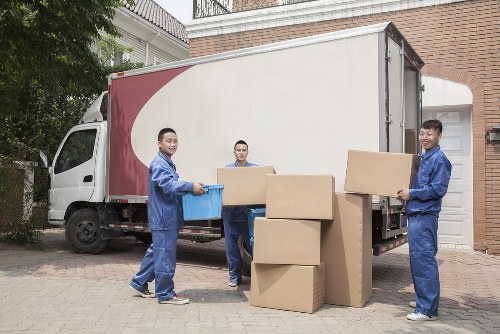White Goods Recycle North London

Recycling white goods in North London is an essential practice that benefits both the environment and the community. White goods, such as refrigerators, washing machines, and dishwashers, are bulky and can take up significant space in landfills if not disposed of properly. By choosing to recycle these appliances, residents of North London can contribute to a more sustainable future.
Recycling white goods helps reduce the demand for new raw materials, which in turn lowers the environmental impact associated with manufacturing. Additionally, recycling programs often recover valuable materials, such as metals and plastics, that can be reused in the production of new goods. This not only conserves resources but also minimizes the energy consumption required for manufacturing.
Moreover, proper disposal of white goods prevents harmful substances, like refrigerants and heavy metals, from leaching into the soil and waterways. These substances can pose significant health and environmental risks if not managed correctly. Therefore, recycling white goods is a responsible choice that aligns with North London's commitment to environmental stewardship.

What Are White Goods?
White goods refer to large household appliances that are essential for everyday living. These appliances are typically white or light-colored, which is how they got their name. Common examples of white goods include:
- Refrigerators
- Washing machines
- Dryers
- Dishwashers
- Ovens and stoves
- Freezers
- Air conditioners
These appliances are integral to modern households, providing convenience and efficiency in various daily tasks. However, due to their size and the materials they contain, proper disposal and recycling are crucial to minimize their environmental footprint.
Understanding what constitutes white goods is the first step towards effective recycling. Each type of appliance has its own components and materials that require specific recycling methods to ensure they are handled safely and efficiently.

Why Recycle White Goods in North London?
Recycling white goods in North London offers numerous benefits that extend beyond environmental conservation. The region is home to a large population, and with that comes a considerable amount of waste generated by households. By recycling white goods, North London can significantly reduce the volume of waste destined for landfills.
One of the primary reasons to recycle white goods is the conservation of resources. Many components within these appliances, such as steel, aluminum, and certain plastics, can be reclaimed and repurposed. This reduces the need for extracting new raw materials, which is both energy-intensive and environmentally damaging.
Additionally, recycling white goods helps to decrease greenhouse gas emissions. The process of manufacturing new appliances from recycled materials typically requires less energy compared to producing them from virgin materials. This energy savings translates into fewer carbon emissions, contributing to the fight against climate change.

How to Recycle White Goods in North London
Recycling white goods in North London involves several steps, each ensuring that the appliances are handled responsibly. Here’s a comprehensive guide to help residents navigate the recycling process:
Collection Services
One of the easiest ways to recycle white goods is by utilizing local collection services. Many municipalities in North London offer curbside pickup for large appliances, making it convenient for residents to dispose of their old appliances without any hassle.
Alternatively, specialized recycling companies provide door-to-door collection services. These companies often charge a nominal fee but offer the convenience of picking up the appliance from your doorstep at a scheduled time.
It's important to check with your local council for specific guidelines and scheduling for white goods collection. Some services may require you to schedule a pickup in advance or adhere to specific disposal criteria.

Recycling Centers
For those who prefer to drop off their white goods, North London boasts several recycling centers equipped to handle large appliances. These centers are designed to safely dismantle and process white goods, ensuring that hazardous materials are properly managed.
Before visiting a recycling center, it’s advisable to contact them to confirm which types of appliances they accept and if there are any specific preparation requirements. Some centers may require you to remove certain components or ensure that the appliance is in working condition.
Recycling centers play a pivotal role in the white goods recycling ecosystem by providing a centralized location for the disposal and processing of large appliances. They ensure that valuable materials are recovered and that environmentally harmful substances are contained.

Costs and Regulations
Understanding the costs and regulations associated with recycling white goods in North London is essential for a smooth recycling process. While some recycling services are free, others may charge a fee based on the type and size of the appliance.
Local councils often provide guidelines on the disposal fees for white goods. These fees help cover the cost of collection, transportation, and processing of the appliances. It’s important to inquire about any potential costs beforehand to avoid unexpected expenses.
In addition to costs, adhering to local regulations is crucial. North London has specific rules regarding the disposal and recycling of large appliances to ensure environmental compliance and public safety. Violating these regulations can result in fines or penalties, so it’s important to familiarize yourself with them before proceeding.
Benefits of Professional Recycling Services
Opting for professional recycling services offers several advantages over DIY disposal methods. Professional recyclers have the expertise and equipment necessary to handle and process white goods efficiently and safely.
- Efficiency: Professionals can quickly and effectively dispose of appliances, saving you time and effort.
- Safety: Handling large appliances involves risks, including heavy lifting and exposure to hazardous materials. Professionals are trained to manage these risks safely.
- Compliance: Professional services ensure that all recycling activities comply with local regulations and environmental standards.
By choosing professional recycling services, you can have peace of mind knowing that your white goods are being recycled responsibly and ethically.
Additionally, some professional services offer incentives, such as discounts on new appliances or rebates, to encourage recycling. Taking advantage of these offers can provide added value while promoting sustainable practices.

Nearby Areas for White Goods Recycling in North London
North London encompasses a variety of neighborhoods, each with its own unique features and recycling facilities. Here are some of the closest areas where residents can recycle their white goods:
- Archway: Located just north of central London, Archway offers several recycling centers accessible to its residents.
- Highgate: Known for its picturesque streets, Highgate provides convenient recycling services for bulky appliances.
- Crispin Road: Situated in Muswell Hill, Crispin Road has dedicated collection points for white goods recycling.
- Wood Green: A bustling area with multiple recycling facilities catering to its diverse population.
- Tottenham: Tottenham offers both municipal and private recycling services, ensuring comprehensive coverage.
- East Finchley: Residents can easily access nearby recycling centers for efficient white goods disposal.
- Barnet: The London Borough of Barnet provides extensive recycling programs for its communities.
- Hampstead: Hampstead's recycling services are well-organized, facilitating the easy disposal of large appliances.
- Finchley With multiple recycling points, Finchley supports its residents in sustainable waste management.
- Chalk Farm: Chalk Farm hosts several recycling facilities that accept various types of white goods.
- East Barnet: East Barnet ensures residents have access to reliable white goods recycling options.
- Whetstone: Whetstone provides efficient recycling services to manage the disposal of bulky household items.
- Cricklewood: Cricklewood offers convenient recycling services tailored to the needs of its community.
- Eastgate: Eastgate’s recycling centers are equipped to handle a wide range of white goods.
These areas are strategically located throughout North London, ensuring that residents have easy access to recycling services. Each neighborhood has its own unique approach to managing white goods recycling, often tailored to the specific needs of the community.

Tips for Preparing White Goods for Recycling
Proper preparation of white goods before recycling is essential to ensure a smooth and efficient recycling process. Here are some useful tips to help you prepare your appliances:
- Disconnect and Unplug: Ensure that the appliance is disconnected from any power source to prevent accidents during handling.
- Clean the Appliance: Remove any food residue, liquids, or other materials to prevent contamination and odors.
- Remove Personal Items: Check for and remove any personal belongings or detachable parts that shouldn’t be recycled.
- Check for Manufacturer Labels: Some appliances may have specific recycling instructions provided by the manufacturer.
- Secure Moving Parts: If applicable, secure moving parts like doors or drawers to prevent injury during transportation.
Following these steps not only facilitates the recycling process but also ensures the safety of those handling the appliances. Taking a little extra time to prepare your white goods can make a significant difference in how effectively they are recycled.
Additionally, consider documenting the recycling process if required by local regulations. Some recycling services might ask for proof that the appliance has been properly disposed of, so having this documentation readily available can streamline the process.
The Impact of Recycling White Goods
Recycling white goods has a profound impact on both the environment and the community. By diverting large appliances from landfills, we reduce the amount of waste that contributes to environmental degradation. Recycling also conserves valuable resources by reclaiming metals, plastics, and other materials that would otherwise be wasted.
According to recent studies, recycling just one ton of white goods can save approximately 3.3 cubic yards of landfill space and recover significant amounts of materials. This conservation effort contributes to the reduction of greenhouse gas emissions and the preservation of natural resources.
Furthermore, the recycling industry creates jobs and stimulates the local economy. Processing and repurposing white goods require a workforce, providing employment opportunities within North London. This economic benefit underscores the broader positive effects of recycling initiatives beyond environmental conservation.

Common Myths About White Goods Recycling
There are several misconceptions surrounding the recycling of white goods that can deter individuals from participating in recycling programs. Let’s address some common myths:
- Myth: Recycling white goods is too expensive.
Fact: Many local councils offer free recycling services for white goods, and some recycling companies provide affordable options. - Myth: It’s better to donate old appliances.
Fact: While donating is a good option if the appliance is still functional, recycling is necessary for disposing of non-working units safely. - Myth: Recycling white goods is inconvenient.
Fact: With numerous collection services and recycling centers across North London, recycling has become more accessible and user-friendly. - Myth: Recycling doesn’t make a significant environmental difference.
Fact: Recycling white goods conserves resources, reduces landfill waste, and lowers carbon emissions, making a substantial positive impact.
Understanding the truth behind these myths can encourage more people to engage in recycling practices, ultimately benefiting the environment and the community.
Educating the public about the realities of white goods recycling is crucial in overcoming these misconceptions and promoting sustainable waste management practices.
Choosing the Right Recycling Service
Selecting a reliable recycling service is key to ensuring that your white goods are recycled properly. Here are some factors to consider when choosing a recycling service in North London:
- Certification: Ensure that the service is certified and adheres to local environmental regulations.
- Reputation: Look for services with positive reviews and a good reputation in the community.
- Services Offered: Verify that the service accepts the specific type of white goods you need to recycle.
- Pricing: Compare prices among different services to find an option that fits your budget.
- Convenience: Consider the ease of scheduling pickups or the proximity of recycling centers.
By carefully evaluating these factors, you can choose a recycling service that meets your needs and ensures that your white goods are handled responsibly.
Additionally, some services offer additional benefits, such as data wiping for appliances like refrigerators and washing machines that may store personal information. These extra features can provide added security and peace of mind when recycling your white goods.

Conclusion
Recycling white goods in North London is a crucial step towards sustainable living and environmental preservation. By responsibly disposing of large appliances, residents can significantly reduce waste, conserve resources, and decrease their carbon footprint. With numerous recycling options available, including collection services and recycling centers, recycling white goods has never been easier.
Moreover, understanding the benefits and following proper preparation steps can enhance the effectiveness of the recycling process. Dispelling common myths and choosing the right recycling service further ensures that white goods are recycled efficiently and ethically.
As North London continues to grow, embracing sustainable practices like white goods recycling will play a pivotal role in maintaining a clean and healthy environment for future generations. By taking action today, residents can contribute to a more sustainable and environmentally friendly community.
Frequently Asked Questions
1. How do I schedule a white goods recycling pickup in North London?
You can schedule a pickup by contacting your local council's waste management service or by reaching out to a private recycling company. Many services offer online booking options for convenience.
2. Are there any costs associated with recycling white goods?
Costs may vary depending on the type of appliance and the recycling service you choose. Some local councils offer free recycling services, while private companies may charge a fee. It’s best to check with the service provider for specific pricing.
3. Can I recycle white goods that are still functioning?
Yes, functional white goods can be donated to charities or second-hand stores. If you prefer to recycle them, ensure they are properly prepared and contact a recycling service for disposal options.
4. What materials are recovered during white goods recycling?
During recycling, materials such as metals (steel, aluminum), plastics, and certain electronic components are recovered. These materials are then processed and reused in the production of new goods.
5. Is it necessary to remove doors or drawers before recycling?
While not always required, removing doors or drawers can make handling and processing the appliance easier. Check with your recycling service for specific preparation guidelines.